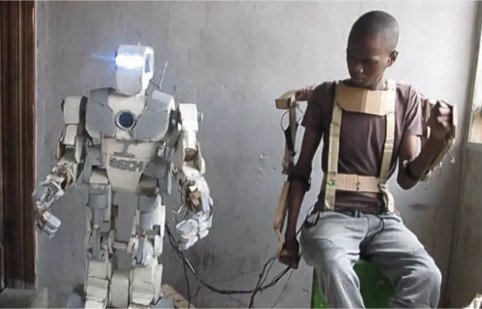BY: OLUWASOLA I. ADEPOJU
Internet can remain a great motor for the future of humankind and its social and economic development, and in fact a safe haven for minors and other vulnerable dependants, if adequate and holistic approach is taken in safeguarding their activities online.

Photo Credit: Amevi Wisdom
The responsibility to do same falls on standards developers, network operators, online service providers, users, governments and international organizations and policy makers. Internet governance requires transnational cooperation if it is to solve problems while retaining the openness and interoperability of cyberspace. For better or worse, national policy plays an important role in shaping the Internet.
What is internet governance?
Internet governance will refer to the rules, policies, standards and practices that coordinate and shape global cyberspace. The Internet is a vast network of independently-managed networks, woven together by globally standardized data communication protocols (primarily, Internet Protocol, TCP, UDP, DNS and BGP). As a wide field of engagement for all, it is highly important for these protocols to be in place and strictly observed. If Internet Governance is done properly, the better for all participants.
Protecting children online is a global challenge, which requires a global approach. While many efforts to improve child online protection are already under way, their reach has been more national than global.
Internet Access Service Providers in this vein have a great role to play in ensuring the availability and compliance with ways and strategies to protect children while using online platforms.
Statistics and the nature of child online risks and dangers.
Various statistics have shown that enormous level of abuse of minors online are recorded yearly and one of the ways to bring the tides down is for policy makers to bring on board and task Internet Access Service Providers to ensure the safety of these group while online.
Online platforms are now more dangerous than we have ever imagined or witnessed as risks that minors and vulnerable dependants may be exposed to online increases, such as sexual predators and grooming, radicalisation and recruitment for terrorist activities.
Last year, the tech industry reported 69 million child sexual abuse images and videos – up by over 50 per cent in just 12 months. In March 2019, the Met Police said they were “overwhelmed” by a surge in online child sexual abuse and exploitation cases.
According to the National Strategic Assessment, more than 3.5 million accounts are now registered to what are considered the world’s most dangerous dark web sites. These are perilous times and actions are being taken to tackle the insecurity.
Is there any Nigerian law that offers child online protection? What are the provisions of this law?
The Nigerian Communications Commission Internet Code of Practice has identified the importance of child online protection and thereby gave enormous responsibilities to IASPs.
NCC ICP with one of the objectives to protect the right of persons to Open Internet has now mandated IASPs to include in its terms and conditions of service, a clear set of rules for the use of the Service that complies with Child Online Protection Policy and all other applicable laws and regulations which are to be visibly seen across their website and other service agreements.
Examples of child online protection strategy or approach adopted by IASPs, digital platforms and other internet fora.
Part of the strategies adopted for child online protection are mechanisms for reporting child sexual abuse content, blocking of access to child sexual abuse content, optional parental control measures and general educative informations to parents, guardians and minors on how to use these features and respond to threats while engaging in online activities.
ALSO READ: WHY YOU SHOULD THINK AGAIN BEFORE REQUESTING FOR THE IDENTITIES OF COVID-19 PATIENTS
Importantly too, parents must also take special interest in the online wellbeing of their children since it is more or less a playground in this age.
OLUWASOLA I. ADEPOJU (SUPREME) is a contributor to YoungNigerian.com and a Trainee Associate at Fulcrum Legal, a commercial law firm in Lagos and a Resource Personnel at African Artists’ Foundation, a Foundation for the promotion of African artists and culture. He is a digital enthusiast and has extensive knowledge in the field with professional certifications.
References
- Nigerian Communications Commission Internet Code of Practice
- Georgia Tech: School of Public Policy
- Engineering and Technology Article
- National Counterterrorism Center




